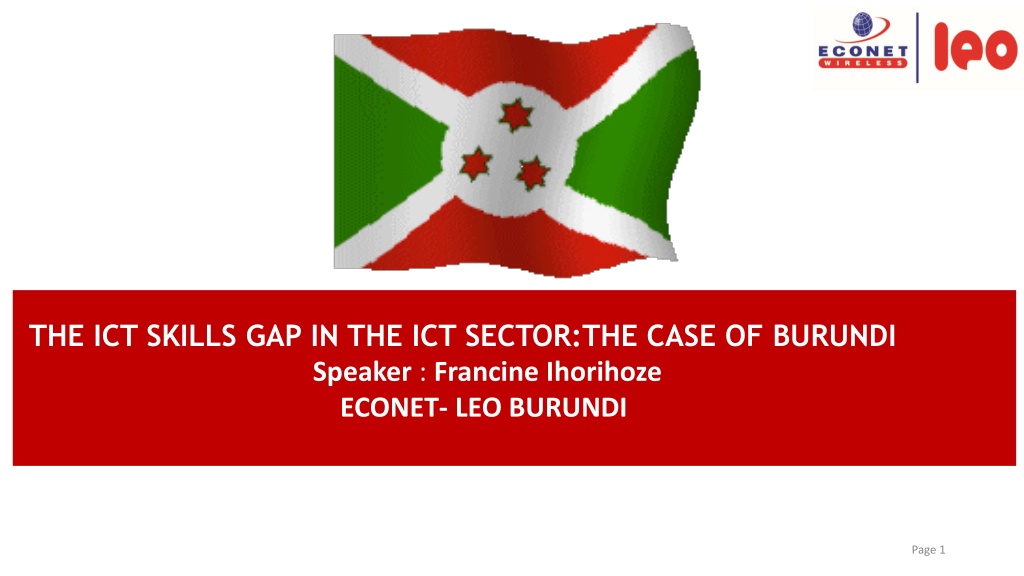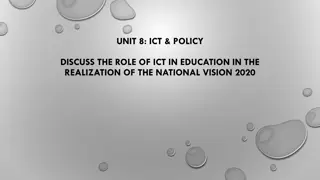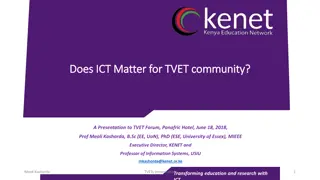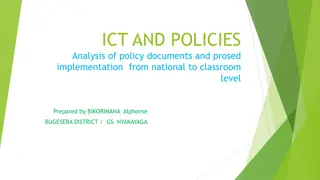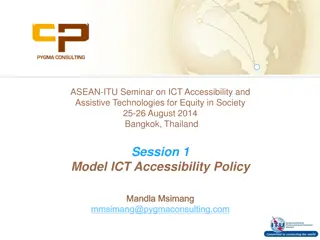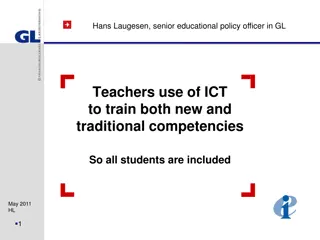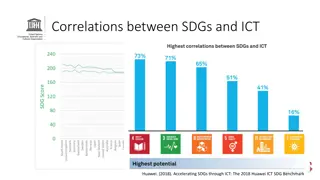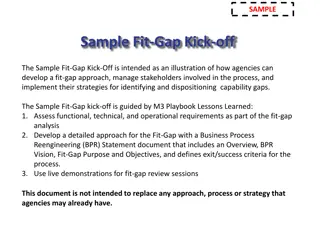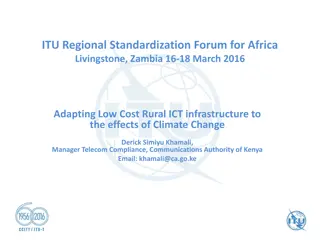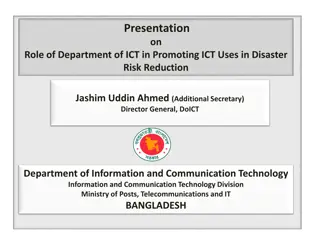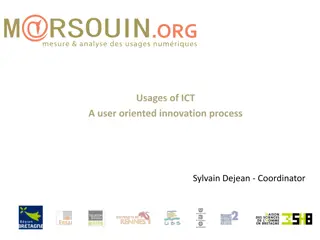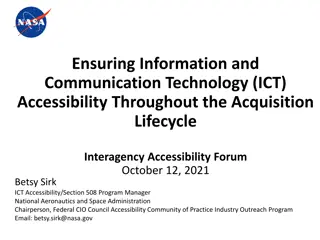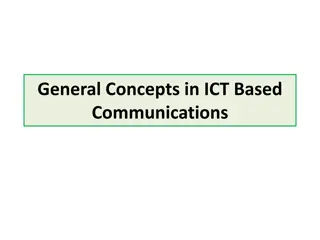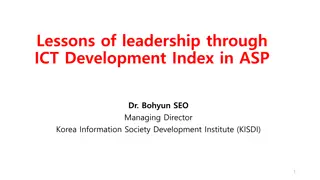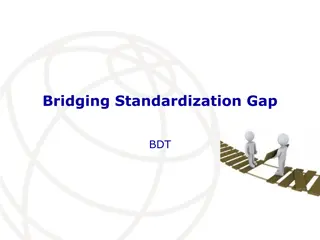Addressing the ICT Skills Gap in Burundi
The case study explores the ICT skills gap in Burundi, highlighting evidence of skills mismatch and shortage in key sectors like IT, networks, and finance. It outlines the impacts on competitiveness and offers recommendations to bridge the gap.
Download Presentation

Please find below an Image/Link to download the presentation.
The content on the website is provided AS IS for your information and personal use only. It may not be sold, licensed, or shared on other websites without obtaining consent from the author. Download presentation by click this link. If you encounter any issues during the download, it is possible that the publisher has removed the file from their server.
E N D
Presentation Transcript
THE ICT SKILLS GAP IN THE ICT SECTOR:THE CASE OF BURUNDI Speaker : Francine Ihorihoze ECONET- LEO BURUNDI Page 1
KEY MESSAGE Evidence of ICT Skills Mismatch Evidence of Skills Shortage Staff & students comments Impact on ICT Sector Competitiveness Recommendation
Skills Mismatch Skills mismatch refers to a situation where existing staff in firms, with the required level of education, do not have the skills they need to do their job effectively (Quality).
Staff ranked having poor skills in key Positions Departments Poor Skills Legal & Regulatory Affairs 0% Sales & Customer Experience 2% Marketing 10% IT 23% Networks 27 % Finance 13,8% HR & Administration 11%
Current Job Vacancies JOB VACANCIES 3 3 3 2 2 1 1 1 1 1 1 1 1 1 0 0 0 0 0 0 0 LEGAL SALES & CE MARKETING IT NETWORKS FINANCE HR & ADM. Junior Middle Manag Comment: High level of vacancies is in IT and Networks due to lack of required skills in Burundi Market
Causes of Vacancies Reasons of Vacancies % Applicant High wage demand Applicant not have required basic skills University not producing sufficent number High Turnover of new Recruits
Difficulties in filling in the vacancies Time needed to fill in available positions? ICT % ICT % Non-ICT % Junior staff 2-3 weeks 1week Supervisory Position 1month 2weeks Managerial Position 1-2months 3weeks Executive Position More than 2months 1month
How do we find new Employees How do we find new Employees ICT % Non ICT % Public advertisements Attachment Programs Head-hunting Personal contacts and references Initiative on the employee side 80% 15% 80% 80% 20% 85% 20% 20% 50% 50%
KEY POSITIONS RECRUITMENT Staff Foreign Univesities Chief Executive Officer (CEO) Staff from Local Universities Risk and Compliance Human Legal & Regulatory Affairs Sales & Customer Services Marketing Technical Information Systems Finance Resources & Administration Fraud & Assurance Network Planning & Deployment Legal Advisors Enterprise Application Customer Experience Marketing HR Manager Financial Control Customer Experience Company Doctor IT Infrastructure Network Operations Consumer Business Consumer Business Administration Budgeting & Management Reporting Billing & VAS Roaming & Interconnect Administration Enterprise Business IT Projects Network Quality & Performance Financial Reporting Financial Services Treasury& Collections Business Analyst Page 11
ECONETLEO ENGINEERS ACADEMIC BACKGROUNG ENGINEERS ACADEMIC BACKGOUND These numbers are closed . This Clarify how skills are lacking in Burundi Universities. 60% INTERCO 40% 60% IT 40% 57% NETWORKS 43% 0% 10% 20% 30% 40% 50% 60% 70% Foreign Local Page 12
ECONETLEO CRITICAL POSITIONS CRITICAL POSITIONS 67% At Executive Level, Only 33% are local staff And 67% are foreign 54% 46% 33% At Management level(next level) 46% are local and 54% are foreign EXCO MANCO Local Foreign Page 13
Training Cost-% of Training Budget -2014 Training Cost Local Trainings External Trainings Legal & Regulatory Affairs 1% 1% Sales & Customer Experience 13% 9% Marketing 15% 18% IT 35% 34% Networks 32% 24% Finance 2% 10% HR & Administration 2% 4%
And Returns to Training are Substantial Employees with basic IT skills and advanced (e.g. programming) computer skills earn 10%;20% and 31% percent higher wages, respectively, than those with no computer skills. Workers who have received formal training from their current employers in the areas of technologies earn 30% percent higher wages, than those who have not received any training from these current employers.(Retention strategy)
Top three Reasons why ICT Lose staff Better offer in other sectors (The companies in the ICT sector find it harder to fill-in job positions, it takes them longer to do so)-scarcity of ICT qualified people Staff going back to school.Inflexibility of educational system which runs during the same working hours push them to resign.(Technology is moving fast and staff have to upskill themselves to be able to meet the required standards) Pressure of Work ICT Sectors are very demanding(work- life balance is low)
IT STAFF & STUDENT COMMENTS Programming Networking Maintenance Academic Package -Non manageable Networks -Plug &play -Academic package: Basic Program:C+,C++,Pascal, HTML Academic package -Theories Workplace -Manageable Networks(configuration,..) -Workplace -Practises Workplace New Programs: JAVA,C SHOP; Dot Net; SGBD,SQL,ORACLE,PHP, . Some universities starts having manageable devices but they use simulation .
OUR STUDENTS ATTACHES BACKGROUNG OUR ICT ATTACHES BACKGROUND Our attaches are selected by an inteview Successuful ones get six(6)months attachement where they get a proper skills transfer program 52% After six month each attachee is evalaued 15% 98%of starting point positions are recruited from them 12% 12% 8% 1% INITEL IST NAT. UN LAC GRAND LA LUMIERE
HEAD OF INITELEMATIC VIEW PRIVATE ICT UNIVERSITY Mr.Sadock Head of the School: Big challenge to adapt our academic program to the Market needs because of Budget issues Big challenge to have qualified &experienced teachers We pay them 15,000per hourx60hours of theories For practice ,we look for very cheap teachers with limited knoweldge We dodn t have modern labo because of limited budget We dodn t have any partneship with other Academic Institution for skills sharing We don t have support from Goverment We don t have partnership with Organizations to train our students except Econet Leo & Smart
ECONET SKILLS GAPS ANALYIS AND SUCCESSION PLAN -2013 IN GENERAL: All recommended Successors have limitations in their Technical and Business Competences. Supervisors need to give a clear Development plan with a deadline. All recommended Successors need can deliver the Trainings. Leadership and supervisory Trainings. HR The only way we can challenge the competition and manage our Succcession plan is to get the right people on the right Positions.There critical skills in Leo ,Africell and Smart. Taking them on Board can be very helpul. are some very
Impact on ICT Sector Poor Performance Revenue Loss Poor competitiveness High training cost High consultancy cost High staff cost-Recruitment from outside the country(5% above he Budget) Burundi foreign law constraint towards Education level- contradiction(foreign staff should not be above 5% at each level)
Recommendation Burundi should focus on growing Burundi s ICT capabilities and skills in the workforce by adopting an appropriate Education Policy. Burundi should accelerate the development and implementation of the Technologies component in the Burundi Curriculum, with a particular focus on computing skills and training of teachers. Higher education institutions should promote the strength and diversity of ICT related study and career paths to students Businesses should provide opportunities for employees to develop their ICT skills through on the job training, workshops, upskilling courses and other business development initiatives. Programs under the Department of Skill Development (Ministry of Labor ) should be strengthened and monitored for results (tracer studies ). Businesses and Universities should develop partnership and provide internship programs to students.
THANK YOU! MERCI! MURAKOZE! AKSANTE! Mwebare !
